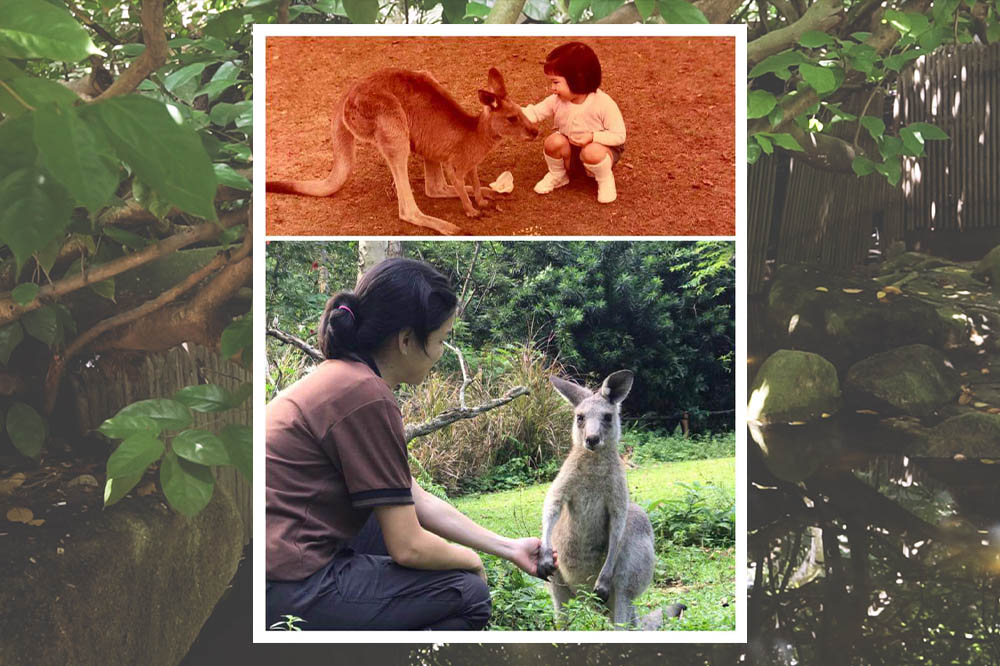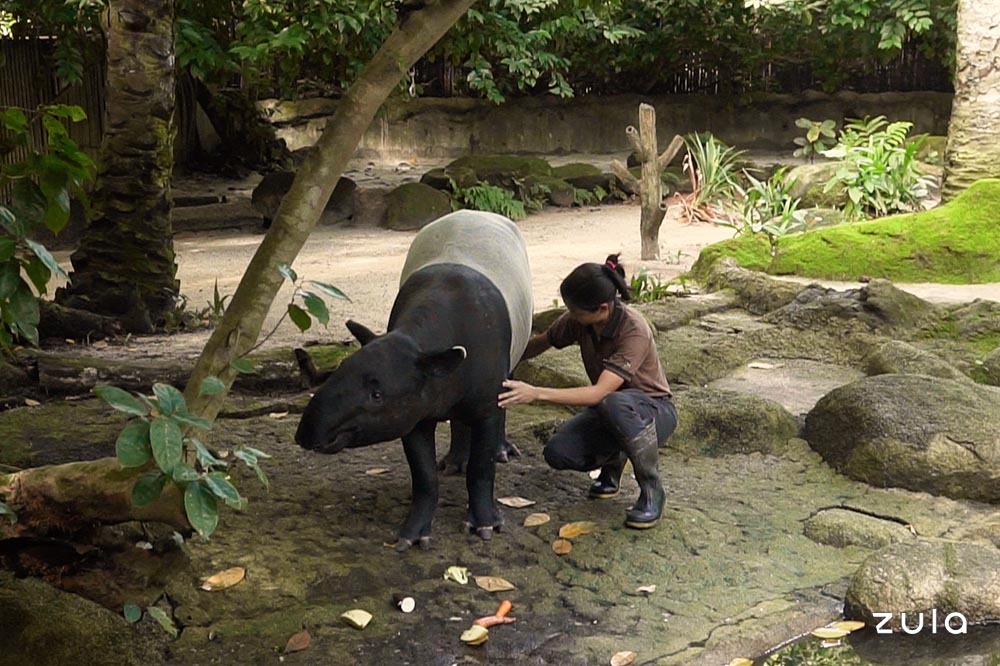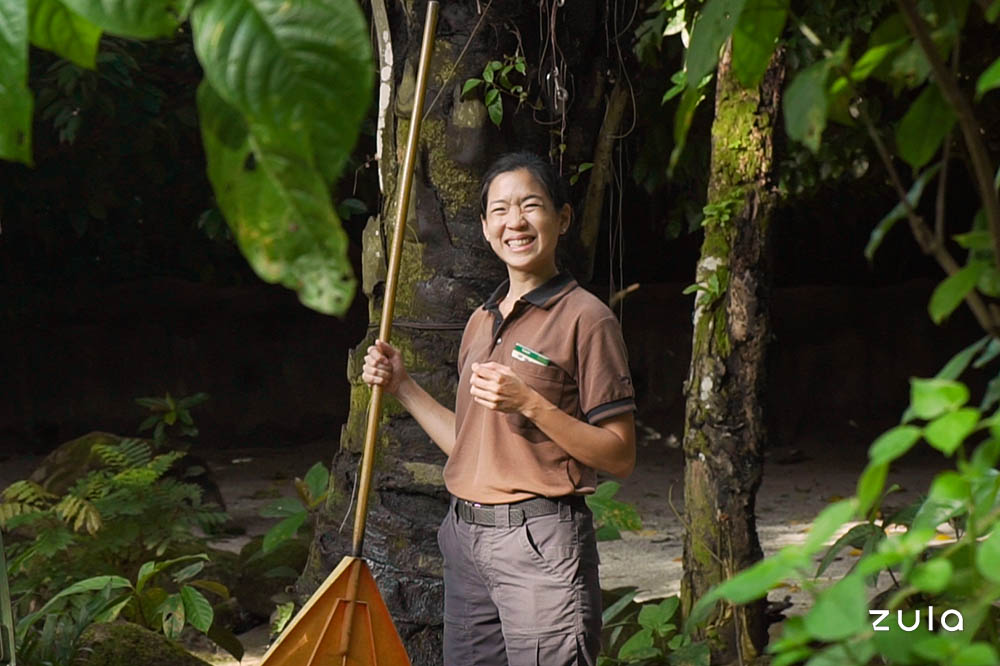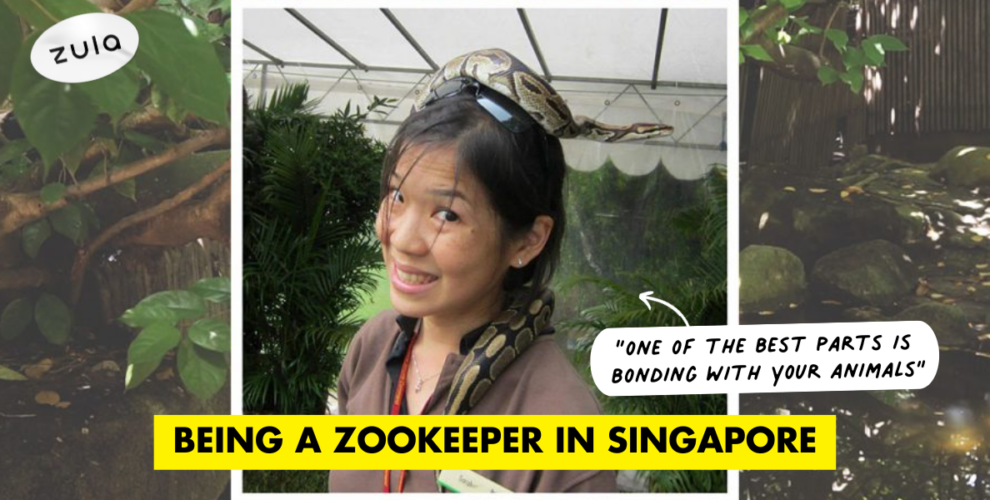Zookeeper In Singapore
“What’s your favourite animal?” I ask Sarah Chin, a zookeeper with the Singapore Zoo. The 40-year-old hems and haws for a good minute before concluding, “I don’t really have a favourite animal.”
“I love them all, I just don’t like monkeys. Oh, I can’t say that. My primate friends will throw stones at me.”
To be fair, I half-expected this to be the most difficult question for Sarah. After all, I was speaking to an “unexceptional student” whose love for animals motivated her to chiong for straight As for her A-levels.
The goal? To enrol in and graduate from Cambridge University’s Zoology programme so she could fulfil her dream of working with animals.
Contents
Applying for zoology because of her love for animals
Since she was a little girl, Sarah has had an affinity with animals. Her love for creatures extends to creepy crawlies. Instead of killing cockroaches and lizards, she used to save the pests and release them outdoors.
“I really wanted a pet snake when I was younger. But my parents, of course, said no,” she recounts with a laugh.
At a tender age, Sarah decided: when she grew up, she would work with animals for a living.
 Sarah with a kangaroo (as a child and as an adult)
Sarah with a kangaroo (as a child and as an adult)
When the time came to apply for university, she discovered via the power of the internet that the University of Cambridge offered Zoology as part of its three-year Natural Sciences programme.
Though her application was successful, the university extended a conditional offer: she had to score four As for the GCE A-Levels before she could enrol.
“Thank God I did. And I guess you could say that I was quite blessed that my parents were able to fund me through my university, without a scholarship.”
In between semesters, Sarah would return to Singapore as she got homesick. It was during two of these summer breaks that she volunteered at the Singapore Zoo’s reptile section to “try being a zookeeper.”
When the then-curator mentioned the zoo had a job opening, it was a no-brainer to apply for a full-time position.
Day in the life of a zookeeper
“One of the best parts about being a zookeeper is bonding with your animals. It really makes you feel very special when you come back to the zoo on your off days. Even when you’re not in uniform and you call the animal’s name, they’ll respond to you.”
With a cheeky grin, Sarah adds, “Yeah, then you can show off to other people that you know the animal.”
 Sarah with the Malayan tapir, one of the animals she was caring for
Sarah with the Malayan tapir, one of the animals she was caring for
However, being a zookeeper is more than feeding and playing with animals. A typical work day begins with keepers counting their animals and checking if they’ve sustained injuries overnight, before cleaning the exhibit and releasing the animals for display. The rest of their time is mostly spent on animal enrichment, training and conditioning.
With an amused smile, Sarah clarifies zookeepers do not stay overnight to guard the animals. Neither do they transfer the animals to the Night Safari come sunset to ‘work’ a double shift.
Keepers are on a shift-work rotation; they work from 8am to 5.30pm, or 8.45am to 6.30pm. Those who work the second shift bring the animals back to their night dens when the zoo closes at 6pm.
Like most of the working population, they have two days off per week. But because the zoo is open year-round, these off days aren’t fixed.
Also read:
This Singaporean Marine Biologist Went From Doing Admin Work To Swimming with Sharks
Ups and downs of working in the zoo
 Sarah cleaning up in the Malayan tapir exhibit
Sarah cleaning up in the Malayan tapir exhibit
Working an atypical job also brings unusual encounters.
“During the Dragon year, I found a lot of money in the Komodo [dragon] exhibit. One dollar, $0.20… people were throwing money to the Komodo dragons hoping that they’ll give them luck. I was like, take, take, take, take, take. Then [the zookeepers used the money and] bought drinks.”
“But then you also get people- if they can’t see the animal and we happen to be in the exhibit, they’ll be like, ‘Oh look, it’s a zookeeper exhibit.’ Or, ‘Look, it’s a homo sapiens exhibit.’ It’s just not funny at all.”
Poking fun of zookeepers is one thing; looking down on them is another. Sarah reveals some think poorly of zookeeping as a profession due to the connotation that labour-intensive jobs are menial.
“I’ve encountered people that tell their children, ‘Oh if you don’t study hard, you’ll end up like her, you know, sweeping and raking in the exhibit.’”
“It used to affect me a lot because I felt a bit offended. Many of my colleagues actually have diplomas and degrees, sometimes not even related to zoology. But they join the zoo out of love for animals or interest in being out in nature.”
Still, she takes these comments in her stride as she knows the ‘dirty work’ they perform is vital to maintain the health of the animals.
“I know some people don’t like zoos because the idea of having animals in captivity turns them off. But we actually work very hard to ensure that the welfare of the animals is optimum.”
Being A Zookeeper In Singapore
As the sun sets, Sarah takes us on a stroll through the zoo to show us some of the animals she’s worked with. We stop to say hi to the giraffes, rhinos and big cats.
“The zoo’s environment really appeals to me. If you’re stressed, you can go out, walk around, have a look at the animals and then go back to your work.
“I tried office work and it just doesn’t suit me. I did leave the zoo in 2014 and tried another job but felt something was missing, so I came back.”
“That’s one thing I really like about this job—every day is different, no two days are the same.”
“The saying goes, ‘Choose a job you love and you won’t work a day in your life. I think that’s very, very true, working here at the zoo.’”
Watch the full video here:
All images courtesy of Sarah Chin.
This article was first published on 23 August 2019 and last updated on 4 December 2023.
Also read:
I’m A Yale-NUS Graduate Who Rejected The Corporate Life To Be An Urban Farmer








